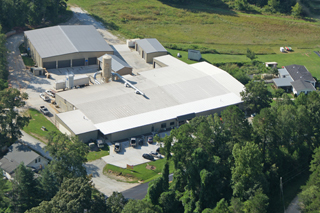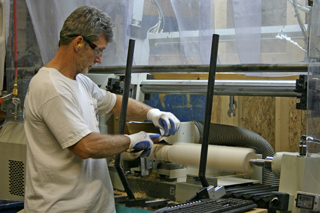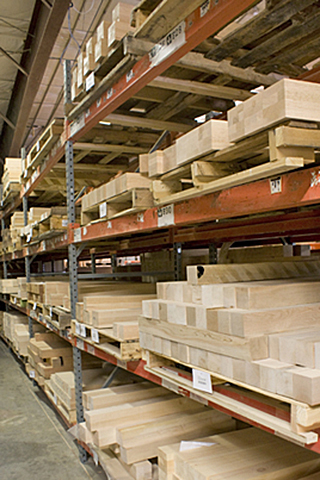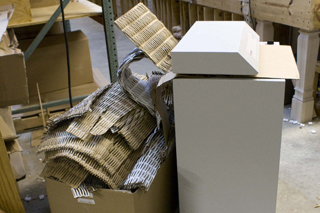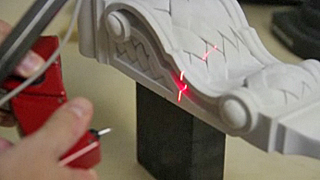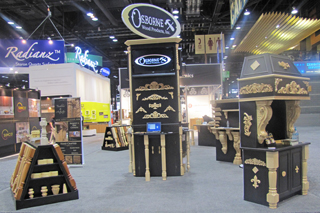
While some companies might pursue greener business practices in the hopes of attracting today’s ecologically minded consumers, Osborne Wood Products has embraced sustainability as an operating principle since it first opened its doors, back in 1979. “It’s a concept we take seriously,” says Leon Osborne, founder and CEO. “Not a trend, but a way of life; we seek to promote sustainability of quality of life, of community, and of the planet in all that we do.”
That could be construed as a tall order for a small company of 32 full-time employees that produce some 700 different wood products, ranging from table and kitchen island legs, to cabinet moldings and onlays, plus corbels, brackets and more. Still, Mr. Osborne openly discusses his commitment to faith values in a video on the company website, which translates to a corporate commitment to “going the second mile” for customers and considering “how the other would want to be treated.” He fosters a corporate culture where being an accountable and responsible manufacturer is the logical extension of being an accountable and responsible person. In fact, his decision to leave the steel industry as a welder and start the company back in the late 70s was in hopes of finding a job that would be better for his health as well as the environment. Wood products was the answer.
Brandon Wyatt, a marketing assistant at Osborne, explains that the company’s three-pronged commitment to sustainability in quality of life, community and planet is practiced each day in tangible efforts. “This approach really gained traction back in 2009 when we updated our business strategy to a Lean Management model and made updates to our front office and warehouse facility. But the fundamentals have always been part of our way of doing business here.”
When it comes to improving quality of life, Osborne provides extensive preventative health care for its employees as well as full health insurance benefits. Nurses and other health care professionals are brought in from time to time to conduct seminars on wellness topics and exercise. “We constructed a 30,000 square-foot fitness facility behind our warehouse in 2004, so that employees and their families could take better care of their bodies.” The gym includes a full basketball court, weight room, cardio room and racquetball court. Wyatt says that because of these kinds of incentives, “we have a very high employee retention rate within the wood products industry … some of our lathe operators have worked here for more than 20 years. Despite the recent economic downturn, we’ve been fortunate enough to continue to add staff. People want to work here, because Osborne takes care of its employees.”
The company also sees sustainability in the broader sense of being responsible to the community. “Some of our employees mentor kids at elementary schools in our Toccoa, Georgia, area. We host site tours for middle school students so that we can talk to them about the importance of getting a good job and how they can prepare themselves for that goal in their lives,” Wyatt says. Osborne Wood Products has participated in fundraisers for literacy programs such as the Stephens Education and Literacy Foundation, plus supporting Atlanta-area homeless shelters and a home for abused and neglected children. Osborne also reaches out to local Boy Scout troops, offering to design graphics for awards and provide other resources for scouting events.
Then, there are Osborne’s efforts toward recycling and reducing other manufacturing impacts on the environment. “We’ve always had bins available for collecting common recyclables like office paper, plastic and aluminum cans. But after our Lean Management efforts took effect, we now also recycle metal tooling, fasteners, blades, lathe parts and steel banding from lumber shipments. We have a machine that turns scrap cardboard into a mesh for wrapping shipments. Our sawdust goes out to poultry farms to be used as bedding, in an effort to re-use what might otherwise just become waste.” The company recycles spent batteries at a local Home Depot, to help prevent heavy metals and acids from tainting groundwater supplies and soil.
A few years ago, Osborne Wood Products researched how it could incorporate low- or no-VOC products and recycled materials into a major building addition. The sheetrock, lumber, insulation, paint sand carpeting that were used in construction were researched to determine their environmental impact. A list of these “green” building products is provided on Osborne’s website.
The company also is hoping to include more Forestry Stewardship Council (FSC) certified wood products in its catalog. FSC is an independent, nonprofit group whose purpose is to promote the responsible management of the world’s forests. FSC certification requires that manufacturers adhere to strict guidelines when harvesting, milling, assembling and even transporting products to market in ways that promote reforestation and responsible forest stewardship. Right now, Wyatt says only about one percent of Osborne’s inventory is FSC certified, but “that’s because we’re in a niche industry; we will add more FSC certified products as the demand increases.” Currently, the company offers certain products made from FSC certified cherry and hard maple. Rubberwood, another eco-friendly species, is used for some carved items. More “green” wood types are being considered.
You can learn more about Osborne’s sustainability initiatives by clicking here.

